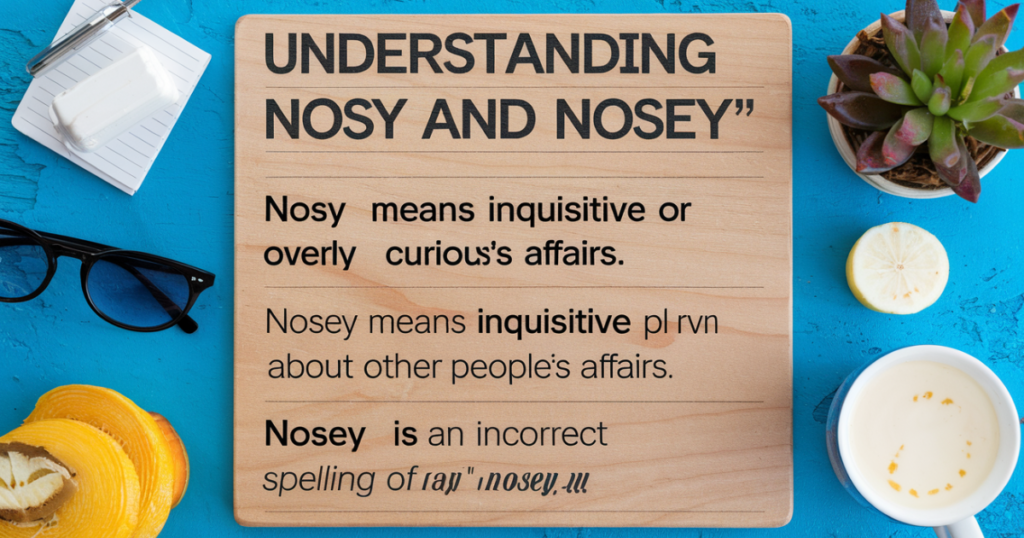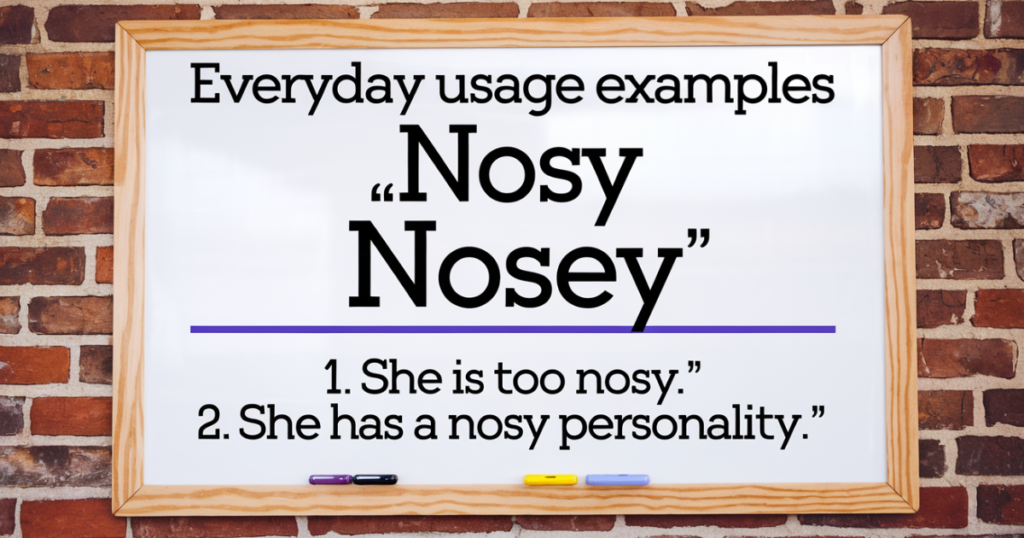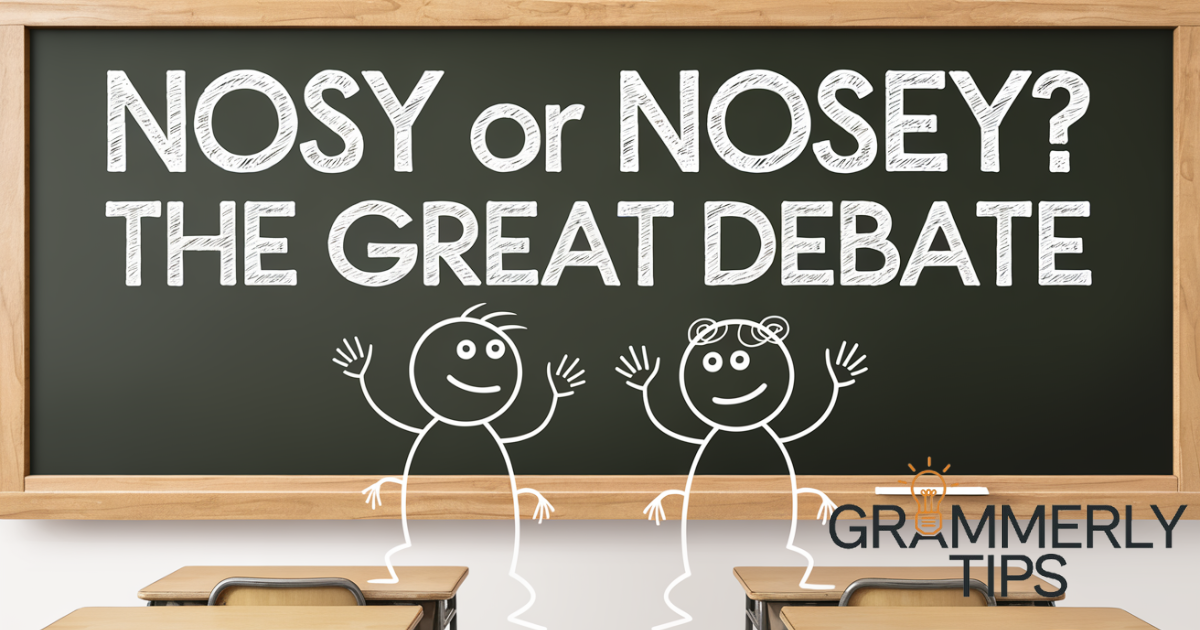When it comes to describing someone who can’t resist poking into other people’s business, you might wonder: is it “nosy or nosey”? This question has stirred debates among language lovers for years. While both spellings are widely recognized, they often prompt curiosity and discussion about which version is correct or if one truly stands out as the “official” spelling.
The answer, as with many quirks of English, isn’t straightforward. “Nosy” tends to be more common in American English, while “nosey” appears sporadically, adding to the confusion. Each spelling has its advocates, with some arguing that “nosey” looks more visually accurate, as it aligns with the word “nose.” Others prefer the simpler “nosy” for its concise look and feel.
Understanding “Nosy” and “Nosey”

Nosy: Definition and Usage
“Nosy” is an adjective used to describe someone who is overly curious or intrusive about other people’s affairs. It often carries a negative connotation, suggesting a lack of respect for personal boundaries.
People labeled as “nosy” are seen as meddling or prying into matters that don’t concern them.
Examples
- Sarah can be so nosy; she always tries to listen in on our private conversations.
- My nosy neighbor peeks through her blinds every time I have visitors.
You Also Like To Read This: Anual Or Annual: Which Is Correct?
Nosey: Alternative Spelling
“Nosey” is an alternative spelling of “nosy,” used to describe someone who is overly inquisitive or meddlesome in others’ personal matters. While “nosy” is more common, “nosey” is sometimes preferred for its visual link to “nose,” reinforcing the idea of “sticking your nose” into others’ business.
Examples
- My sister is so nosey; she reads my messages whenever I leave my phone unattended.
- The nosey reporter kept asking intrusive questions about their personal lives.
Side-by-Side Comparison
Here’s a side-by-side comparison of “Nosy” and “Nosey” to help highlight their similarities and subtle differences:
| Aspect | Nosy | Nosey |
| Definition | Describes someone overly curious or intrusive | Same meaning as “nosy,” with emphasis on alternative spelling |
| Usage | More commonly used in American English | Less common, but used interchangeably with “nosy” |
| Spelling Preference | Often preferred for its shorter, simpler appearance | Preferred by some due to its connection to the word “nose” |
| Connotation | Can imply prying or meddling, usually with a negative tone | Also suggests prying, with a similar negative tone |
| Key Difference | Standard spelling in American and British English | Alternative spelling, less formal, but visually connects to “nose” |
| Examples | – He’s too nosy for his own good. | – She’s always been a bit too nosey. |
| – My nosy friend wants to know everything. | – A nosey neighbor can be a nuisance. |
In summary, while “nosy” is the standard spelling in both American and British English, “nosey” is an alternative that some prefer for its visual association with the word “nose.” Both carry the same meaning and negative connotation.
Everyday Usage Examples

Nosy
- My coworker is so nosy; she always tries to read my emails over my shoulder.
- It’s hard to keep anything private with such a nosy neighbor around.
- Jake’s nosy questions made everyone at the party uncomfortable.
- I wish my sister weren’t so nosy about my relationships.
Nosey
- The nosey journalist wouldn’t stop asking personal questions during the interview.
- Having a nosey boss can make work feel a bit suffocating.
- My nosey aunt loves to pry into every detail of our lives.
- If you weren’t so nosey, you wouldn’t have overheard our private conversation.
FAQs
What is another word for nosey?
Another word for “nosey” is “intrusive” or “meddlesome,” which both imply excessive curiosity.
Is nosey an insult?
Yes, “nosey” can be an insult, as it often implies a lack of respect for others’ privacy.
Is being nosey good or bad?
Being nosey is generally viewed as negative, as it suggests unwelcome interference in personal matters.
Which is correct, nosey or nosy?
Both “nosey” and “nosy” are correct, but “nosy” is more commonly used, especially in American English.
Is it Nosy or Nosey Neighbours?
“Nosy Neighbors” is the standard spelling, though “Nosey Neighbors” is also acceptable in informal contexts.
Conclusion
In conclusion, whether you use “nosy” or “nosey,” both spellings convey the same idea of someone intrusively curious about others’ affairs. While “nosy” is the more commonly accepted form, especially in American English, “nosey” provides a visual link to “nose,” reinforcing the image of someone “sticking their nose” into others’ business.
Both terms carry a slightly negative tone, often suggesting a lack of respect for privacy. Regardless of spelling, being labeled “nosy” is generally seen as undesirable. Ultimately, the choice between “nosy” and “nosey” depends on personal or regional preference.

Grammerlytips.com, authored by Jame, offers expert tips and insights on mastering grammar, enhancing writing skills, and boosting communication effectiveness.

